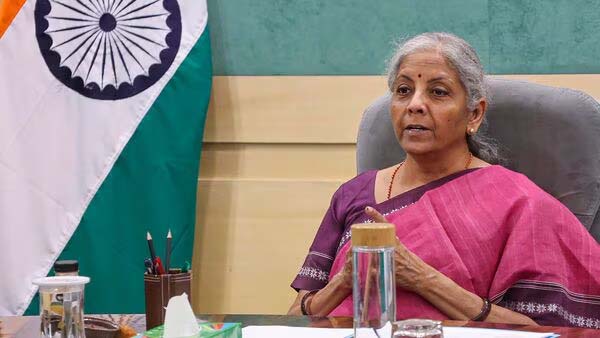Assuming the reins of the Finance Ministry for her second consecutive term at South Block in Delhi on Wednesday, Nirmala Sitharaman extends her legacy as the country’s first full-time female Finance Minister. Credited with steering the Indian economy through the tumultuous waves of the pandemic, she has propelled the nation towards the distinction of being the fastest-growing major economy amidst global recessionary fears.
Her imminent task includes presenting the final Budget for FY ’25, poised to delineate the priorities and trajectory of the Modi 3.0 government towards a developed India. Upon her arrival at the North Block office, Sitharaman was warmly welcomed by Finance Secretary T V Somanathan and other top officials, alongside Minister of State for Finance Pankaj Chaudhary, who assumed charge a day earlier.
Sitharaman, a trailblazer in her own right for championing second-generation reforms in her preceding term, is set to etch her name in the annals of history by presenting her seventh consecutive Budget, marking a sixth full Budget in succession.
The upcoming Full Budget for FY ’25 is anticipated to be laid before the newly convened 18th Lok Sabha in the ensuing month. Sitharaman’s political journey is adorned with milestones; from being the first female Raksha Mantri (Defence Minister) in 2017 to her tenure as the Minister of Industry and Commerce, she has consistently shattered glass ceilings.
When her mentor Arun Jaitley, then Finance Minister, fell ill, Sitharaman assumed the mantle of the finance portfolio in the newly re-elected Modi government post the 2019 general elections, thereby becoming the first full-time female Finance Minister in Independent India.
Notable among her early reforms was a significant reduction in the base corporate tax, from 30 per cent to 22 per cent, aimed at revitalizing an economy grappling with the aftermath of demonetization and GST implementation. Despite the challenges posed by the Covid-19 pandemic, India emerged resilient under her stewardship, sustaining its position as the fastest-growing major economy and a beacon of hope in the global economic landscape.
In response to the pandemic-induced adversities, the government unveiled a comprehensive economic package worth Rs 20 lakh crore, equivalent to approximately 10 per cent of India’s GDP. Sitharaman orchestrated a remarkable turnaround, steering the economy from a nearly 24 per cent contraction in the first quarter of FY21 to emerge as the world’s fastest-growing economy.
Undeterred by the exigencies of fiscal expansion, Sitharaman remained steadfast in her commitment to fiscal prudence, successfully narrowing the fiscal deficit to 5.6 per cent of GDP, down from the earlier estimate of 5.8 per cent in FY24. Her tenure has been marked by a series of unprecedented achievements, including presenting six consecutive Budgets — five annual Budgets and one interim — a feat previously accomplished only by former Prime Minister Morarji Desai.
Emulating her mentor’s departure from tradition, Sitharaman also eschewed the customary Budget briefcase in favor of a ‘bahi-khata’ adorned with the National Emblem to house her speech and accompanying documents.
Born in Madurai on August 18, 1959, to Narayan Sitharaman, a railway employee, and Savitri, a homemaker, Nirmala Sitharaman pursued her studies in economics at Tiruchirapalli’s Seethalakshmi Ramaswami College before furthering her education with a Master’s and M.Phil from Jawaharlal Nehru University (JNU) in New Delhi.
Prior to her foray into politics, Sitharaman traversed the corridors of the corporate world in the UK alongside her husband Parakala Prabhakar, whom she met during her tenure at JNU, marrying in 1986. Blessed with a daughter, Parakala Vangmayi, Sitharaman embarked on her political journey in 2008, swiftly rising through the ranks to become the BJP’s second woman spokesperson after Sushma Swaraj, thereby etching her presence in both the party’s inner circle and the public sphere.
Before venturing into politics, she served as the deputy director of the Centre for Public Policy Studies in Hyderabad and spearheaded the establishment of a school in the city. Additionally, Sitharaman’s tenure as a member of the National Commission for Women from 2003 to 2005 further underscored her commitment to public service and societal welfare.




